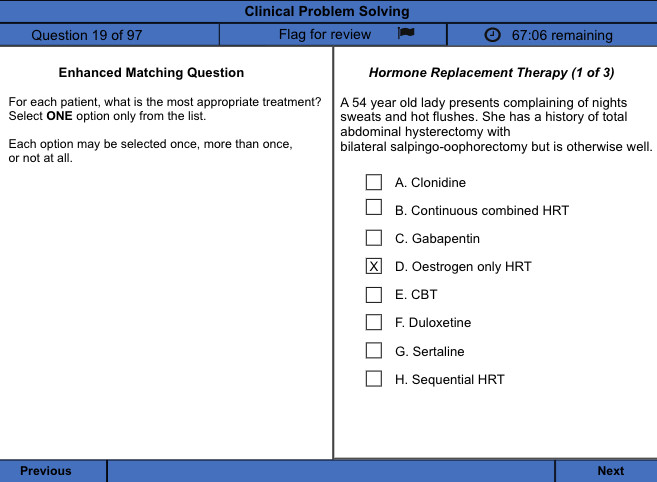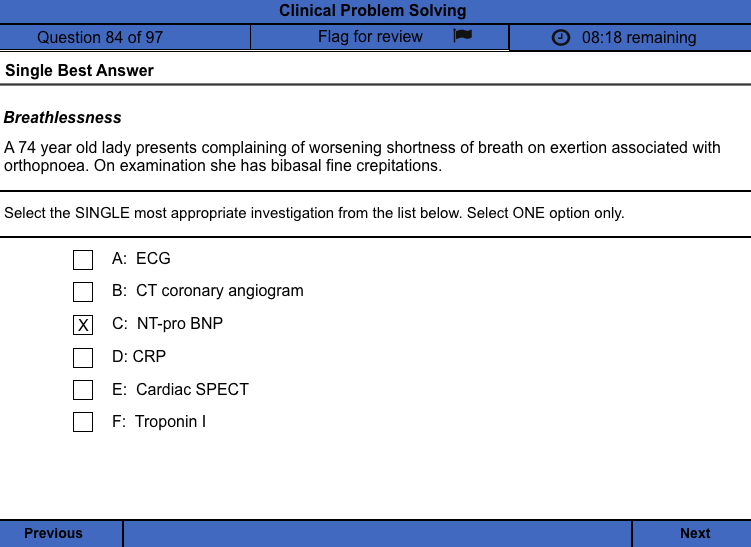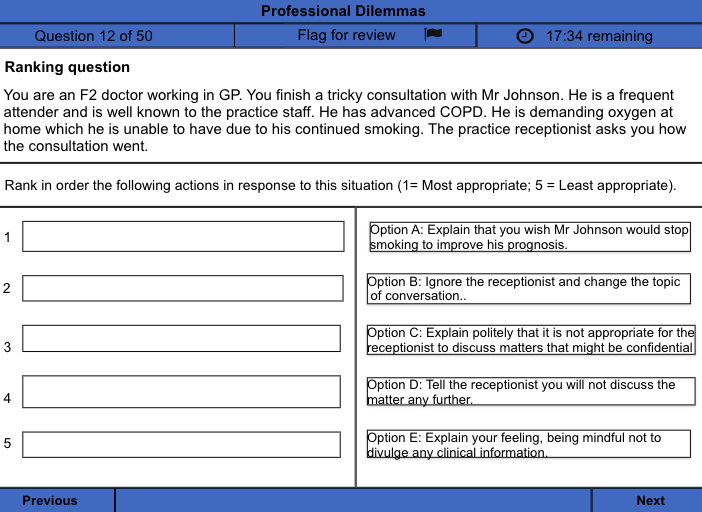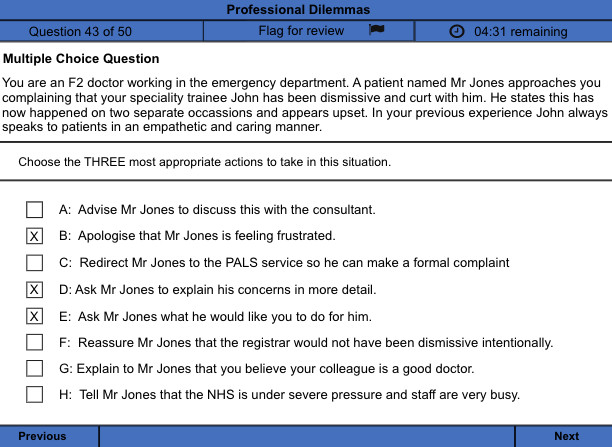Everything you need to know about the MSRA
The Multi-Speciality Recruitment Assessment (MSRA) is computer-based exam sat by more than half of doctors applying for speciality training every year. Our complete guide to the MSRA 2024 covers everything you need to know to ace the exam, giving you the best chance of securing your first choice training offer. We will cover:
- Which specialities use MSRA?
- When and where is the MSRA exam in 2024?
- The structure of the exam: Papers, number of questions and timings.
- Everything you need to know about the Clinical Problem Solving paper.
- How to prepare for the Professional Dilemmas paper.
- How to study for the MSRA - our top tips and advice for guaranteed success.
Which speciality training programmes require the MSRA?
The MSRA is becoming an increasingly important part of application to speciality training. In 2024, the following specialities use the MSRA exam:
- Acute Care Common Stem Emergency Medicine
- Anaesthetics
- Broad Based Training
- Community and Sexual Reproductive Health
- Core Surgery
- General Practice
- Neurosurgery
- Nuclear Medicine
- Obstetrics and Gynaecology
- Ophthalmology
- Psychiatry (Core and CAMHS)
- Radiology
The MSRA is of particular importance to General Practice and Core Psychiatry applicants, where offers are made solely on the basis of a candidates score.
Where & When is the MSRA Exam, 2024?
MSRA exam dates 2024
Candidates are able to choose a date to sit the MSRA exam within the given ‘exam window’. The window is a period of consecutive days, usually over 1-2 weeks.
The MSRA exam dates for 2024 are as follows:
- Round 1 - exam window: 4th – 16th January 2024
- Round 2 - exam window: 6th – 13th September 2024
More details of the recruitment timeline can be found here.
Remember that you are entitled to ‘Professional Leave’, regardless of your current rotation, and employment law ensures your right to this (just in case your rota co-ordinator gives you any trouble..).
MSRA exam centres - Pearson VUE
Most candidates sit the MSRA exam at Pearson VUE test centres during the exam window, both in the UK and internationally. You can find your nearest Pearson VUE centres here.
If you are unable to sit the exam in a Pearson VUE centre, you can apply to write the exam remotely if you meet the criteria. More information is available here.
When are the MSRA results released?
MSRA results can be expected 4 weeks following the start of the exam window. For 2024, MSRA results are expected by the 9th February 2024.
How much does the MSRA exam cost?
The MSRA exam is free of charge, though expenses such as travel or accommodation are not reimbursed, and must be covered by the candidate.
The structure of the MSRA
The MSRA exam consists of two papers and is taken over a total of 2 hours and 55 minutes. The papers include a Professional Dilemmas paper and a Clinical Problem Solving paper. You are entitled to a 5 minute break between papers (included in the time), to use the restroom etc. We will go into more depth on each of these papers below.
How many questions are there in the MSRA?

Clinical Problem Solving paper
The Clinical Problem Solving paper evaluates the candidates clinical knowledge. According to the MSRA blueprint, each scenario is based on ‘Foundation-level clinical practice’, and assesses the application of knowledge in everyday clinical scenarios.
As above, the paper lasts 75 minutes and is comprised of 97 questions, leaving 46 seconds per question. There are two types of questions - Extended Matching Questions and Single Best Answer Questions.
Extended Matching Questions
Extended matching questions (EMQs) are made up of multiple clinical scenarios, each of which is followed with the same list of 6-12 ‘responses’ or answers. Each answer can be chosen once, multiple times or not at all when responding to each of the EMQ scenarios.
Example EMQ 1
Antibodies
For each case, what is the most appropriate investigation?
Select only ONE option from the following.
Each option may be selected not at all, once, or multiple times.
A. Anti-SCL-70 antibodies
B. Anti-Mi-2 antibodies
C. Anti-histone antibodies
D. Anti-smith antibodies
E. Anti-Ro antibodies
F. Rheumatoid factor
G. Anti-Jo-1 antibodies
H. Serum anti-proteinase 3 antineutrophil cytoplasmic antibodies
Antibodies (1 of 3)
A 39 year old woman with dry, irritated eyes, difficulty swallowing her food, and generalised joint pains. Schirmer’s test is positive
Antibodies (2 of 3)
A 61 year old man with shortness of breath on exertion. He reports feeling very weak and has a macular rash across his upper back and shoulders.
Antibodies (3 of 3)
A 33 year old person with 2 weeks of pain in their ankles, feet, knees and hands. Their joints feel stiff for an hour or so after getting out of bed. X-rays show juxta-articular osteoporosis.
Example EMQ 2

Single Best Answers
Single Best Answers (SBAs) are more of a standard multiple choice question, where a clinical scenario is followed by 5-8 answers (Usually A-E). The candidate must choose the ‘best’ answer from the list.
Example SBA 1
Hot flushes
A 52 year old woman with hot flushes, night sweats and mood swings. Her past medical history includes diabetes and an emergency hysterectomy for post-partum haemorrhage.
Select the SINGLE most appropriate management from the options below.
A. Oestrogen-only HRT
B. Sequential combined HRT
C. Low dose vaginal oestrogen
D. Pregabalin
E. Continuous combined HRT
Example SBA 2

Clinical Problem Solving - Content & Target Domains
CPS questions are based on 12 ‘clinical topic areas’, with a balanced weighting between each. The 12 clinical topic areas:
- Cardiovascular
- Dermatology / ENT / Eyes
- Endocrinology / Metabolic
- Gastroenterology / Nutrition
- Infectious Disease / Haematology / Immunology / Allergies / Genetics
- Musculoskeletal
- Paediatrics
- Pharmacology and Therapeutics
- Psychiatry / Neurology
- Renal / Urology
- Reproductive
- Respiratory
The CPS also evaluates 5 key domains as follows:
- Investigation: Conducting appropriate tests to diagnose or exclude diagnoses.
- Diagnosis: Correctly identifying a diagnosis by evaluating the clinical presentation.
- Emergency: Competent recognition and management of emergency presentations.
- Prescribing: Advising and reviewing medications as part of a management plan.
- Non-prescribing Management: Effectively implementing non-medical measures as part of a patient's clinical management plan.
To illustrate this, example EMQ 1 assesses the musculoskeletal (6) clinical topic area and investigation (1) domain. Example SBA 1 evaluates the reproductive (11) clinical topic area and prescribing (4) domain.
Professional dilemmas
The Professional Dilemmas (PD) element of the MSRA functions as a Situational Judgement Test (SJT), assessing the candidate’s approach when confronted with complex professional dilemmas. Unlike the Clinical problem Solving questions, the PD paper is not an assessment of knowledge, but is designed to evaluate specific professional attributes. It closely resembles the SJT that UK graduates sat prior to foundation training. Importantly, there is no negative marking throughout the paper.
Context of PD scenarios
The PD paper is set within the context of the Foundation Programme, requiring candidates to adopt the role of an F2 doctor. Questions reflect the spectrum of rotations experienced during the foundation program, including wards, general practice, clinics etc.
Number of PD Questions & Timings
The PD paper comprises 50 questions with a time limit of 95 minutes. This gives each candidates 1 minute and 53 seconds for each question.
Target Domains Measured
The PD paper assesses three target domains; professional integrity, coping with pressure, and empathy and sensitivity. Each target domain has a number of ‘behavioural indicators’ which are assessed in each question. Try and keep these at the forefront of your mind when answering each question, as these domains are what you are evaluated against.
Professional Integrity
- Honest
- Willing to admit to and take responsibility for one’s mistakes
- Respectful of others
- Maintains the boundaries between personal and professional life
- Able to manage ethical conflicts concerning demands, resources, and expectations.
- Proactive
- Dedicated to providing equal care for all patients
- Always acts in the best interest of the patient
Coping with pressure
- Emotional intelligence, manages own emotions
- Understands the limits of one’s competence and sees helps when required
- Maintains a professional demeanour, and maintains composure in high-pressure environments
- Responds flexibly when required
- Resilient - handles criticism well
Empathy and sensitivity
- Empathetic and caring to both patients and colleagues
- Able to understand situations from the perspective of the patient or colleague
- Empowers patients, involving them in their own care where possible
- Acknowledges and explores the patients wishes
- Patient-centred approach - tailors care to each patient as an individual
- Non-judgmental
Question types and formats
There are 50 questions in the PD paper. Roughly half of those are ranking questions, and half are multiple choice questions. There is no negative marking so all questions should be attempted.
All PD questions begin with a stem, in which an issue has arisen, or an obstacle has occurred. The candidate will then have a set of responses to choose from in order to best resolve the issue.
RANKING QUESTIONS
“Rank in order the following actions in response to this scenario (1 = Most appropriate, 5 = Least appropriate”
You will be asked to rank the appropriateness of 4 or 5 actions, according to which most effectively resolves all issues within the question stem. It is important to remember that each answer must be treated as an independent, discrete action. They are not chronological actions and must be taken on their own merit.
The order in which you rank the answers is compared to a predetermined key. More marks are awarded for answers ranked in a similar position to where they fall in key (if in the same position this scores 4). A score is given for every answer. These are added up to give a total score for the question (maximum 20).
Example Ranking Question 1
You are a F2 in the Pediatrics Department, currently managing a hectic evening shift. A nurse approaches you confidentially with concerns about your colleague, Sarah, who is also an F2. The nurse discloses that she observed Sarah making several errors during the day, and when confronted, Sarah became visibly distressed, expressing difficulty coping with the workload.
Rank in order the following actions in response to this situation.
1 = Most appropriate
5 = Least appropriate
a. Discuss distribution of workload with the other junior doctors.
b. Have a conversation with Sarah about the nurse’s concerns.
c. Advise the nurse to suggest Sarah makes an appointment with occupational health.
d. Recommend that the nurse contacts your consultant to discuss her concerns about Sarah.
e. Consult with your registrars as to how to support Sarah.
Example Ranking Question 2

MULTIPLE CHOICE QUESTIONS
“Choose the 3 most appropriate actions to take in this situation”.
You will be asked to select the 3 most appropriate actions, which when taken in combination, most comprehensively resolve all issues within the scenario.
Scoring for each MCQ is easier to work out. Each correct response scores 4. An incorrect response scores 0. Therefore a candidate can score 0, 4, 8 or 12 (full marks) for each MCQ.
Example MCQ 1
You are an F2 doctor working in psychiatry. You have just conducted a teaching session for medical students, utilising a presentation you had prepared specifically for the occasion. However, your consultant informs you that the feedback from the students was unsatisfactory.
Choose the 3 most appropriate actions to take in this situation
a. Request feedback on your teaching from your F2 colleagues.
b. Request more detailed feedback from the consultant regarding the teaching session.
c. Confront the medical students, demanding more in-depth feedback.
d. Sabotage your colleagues' presentation next week to make yourself appear better.
e. Enhance your knowledge on the subject through additional reading in preparation for future sessions.
f. Request that your consultant observes your performance in the next teaching session.
g. Document this experience as a reflective entry in your Foundation portfolio.
h. Raise a complaint with your educational supervisor.
Example MCQ 2

Professional dilemmas Tips
Timing is essential
The PD question stems can be wordy, and the actions are often vague or very similar. Remember that you only have 95 minutes to complete 50 questions. This equates to 1.9 mins per question (or 1 minute and 53 seconds), so try not to get too bogged down. Once you’ve got the basics down, make sure you practise questions in a timed environment.
You may find that one question type takes you longer than the other (e.g. often ranking questions are more wordy and ambiguous than MCQs). So it’s a good idea to have an idea of this before you sit the exam and adjust your timings as required.
When you sit the exam there is a timer at the top of the screen. It is worth remembering that after:
- 22 minutes you should have completed approximately 12 questions
- 44 minutes you should have completed approximately 24 questions
- 66 minutes you should have completed approximately 36 questions
- 88 minutes you should have completed approximately 48 questions
No negative marking
- There is no negative marking - make sure you have a crack at every question. You’re almost guaranteed to pick up some points even with a wild guess.
Target domains at forefront
- Keep the target domains at the forefront of your mind.
- They sound a bit cliche, and very ‘GMC good medical practice’, but they form the basis of the scoring system.
- If you’re stuck for an answer go back to the basics, and think about which principles each action represents.
Identify the problem
- Ensure that you clearly identify the ‘issue’ in each scenario. Make sure you think about every person/party that is mentioned within the question stem.
- Choose the action/combination of actions that most completely resolves every issue for every person that is mentioned (whether it’s the patient, their relative, the nurse or your colleague)
Ranking questions - discrete actions
- Remember to treat each answer in ranking questions as an independent, discrete action. They are not performed in chronological order, nor are they combined.
- Each action is a single response and must be taken on its own merit.
MCQs
- To the contrary, the answers in MCQs are used in combination.
- Make sure you choose a combination of answers that most completely resolves the issue within the scenario for each person that has been affected in the scenario.
How to Prepare for the MSRA - Our Top Tips & Advice
How long should I study for the MSRA?
- One of the most challenging aspects of the MSRA is it’s breadth of content.
- It’s likely that you won’t have reviewed many areas since medical school. For example, obs & gynae, paediatrics or psychiatry.
- For this reason, most candidates allow themselves 3-4 months to prepare for the MSRA.
- You may need less if you’ve recently studied for exams such as the MRCP, but you may also need longer if you’ll find yourself on an intense on-call rota in the months before the exam.
- Don’t leave your preparation until the last minute!
Timing is tight
- Another challenging aspect about the MSRA is timing.
- Remember, you only have 46 seconds for each CPS question and less than 2 minutes for the PD questions which can be wordy and ambiguous. So there isn’t time to dwell.
- If you don’t know an answer, have an educated guess and flag the question for review at the end. Or you may end up missing easy marks at the end of the paper.
No negative marking
- There is no negative marking. If you don’t know, have a guess and move on.
Pearson VUE preview
- Before exam day, make sure you familiarise yourself with the layout and buttons that you will use on exam day.
- Once you’ve signed up to Pearson VUE, you will be able to access an example paper which demonstrates how things will work on the day.
What resources should I use to prepare for the MSRA?
- The most effective way to prepare for the MSRA is through a combination of studying essential knowledge and applying this in MSRA practice questions.
- ReviseMSRA has an extensive library of up-to-date revision notes, based on the latest guidance, which forms an excellent basis for MSRA exam success.
- Practice questions. We developed Revise MSRA to replicate the official MSRA questions as closely as possible in content, style and format. We may be biassed, but we really believe these are the best available on the market!
Simulate exam conditions
- Once you feel confident with the content, simulating exam conditions is a great way to prepare.
- We recommend practising questions in timed conditions, and choosing ‘all categories’, to reflect the random order of questions you will face on the day.
- Make sure you also review the official MSRA practice questions, but be aware that these are considered easier than the official questions by most candidates.
MSRA preparation - Useful resources
